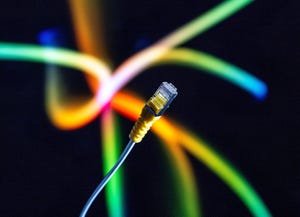Will network operators cheer a Google v Apple AI battle?
Google is working to infuse AI technology across its Android software and Pixel hardware. Apple, meanwhile, is reportedly working with OpenAI on AI software for the iPhone.
Google recently wrapped up its Google I/O developer event this week, and according to some smartphone analysts, the company's latest announcements hint at its desire to more tightly tie together its Android software with its Pixel hardware efforts to more effectively compete with iPhone maker Apple.
That trend comes as both Google and Apple work to infuse AI technology across their respective ecosystems.
However, it's not yet clear how those efforts will affect other companies in the technology and telecom markets, including network operators like AT&T and Android smartphone makers like Samsung.
Google's latest moves "will doubtless trouble Android licensees like Samsung, which are already feeling competitive pressure from Pixel devices in some markets," CCS Insight analyst Ben Wood wrote on CCS Insight's website.
Others have a different view. Analyst Cliff Maldonado of BayStreet Research acknowledged that the emergence of AI technology on smartphones could help shift the "balance of power" into Google's Pixel devices, given Google's expertise in AI. But he said he doesn't expect Google to directly threaten Android licensees like Samsung with its AI-powered Pixel gadgets.
Reorganizing for AI
According to The Verge, Google last month announced its new "Platforms and Devices" business unit that will oversee all of Google's Pixel-branded products, as well as all of Android, Chrome, ChromeOS, Photos, and more. That division will be headed by Rick Osterloh, a former Motorola executive who joined Google in 2016 to lead the company's Pixel-branded hardware efforts.
In addition to licensing Android to smartphone makers ranging from Samsung to Xiaomi, Google also makes its own Android-powered devices under its Pixel brand.
Osterloh's apparent promotion appears to push Hiroshi Lockheimer – the longtime head of Android, Chrome and ChromeOS – into other areas of Alphabet's Google business.
"We believe Google will consider this move essential to taking the fight to Apple, and it reinforces our view that the company sees Pixel devices as a way to demonstrate 'the art of the possible' to Android licensees," Wood wrote following the close of the Google I/O developer event this week.
At Google I/O, the company announced new updates to its Android platform, including new AI functions and improved privacy and theft functions.
Meanwhile, Apple continues to dominate the US smartphone market with a 52% share, according to Counterpoint Research. Apple is widely expected to announce its own new AI-powered services at its own developer event in June, potentially via a deal with OpenAI.
In that regard, Apple would be teaming with a direct competitor to Google in the AI marketplace.
Pursuing an AI future
But how exactly will Google's new "Platforms and Devices" business unit operate in an age of AI? And what will it mean for other companies in the Android ecosystem, such as device makers like Samsung and wireless network operators like AT&T and Verizon?
"Google has a chance to be quick here," said BayStreet's Maldonado. He said Google may be more nimble than Apple when it comes to integrating AI functions into its Pixel gadgets and its Android platform.
He said that Osterloh has been working to bring AI into Google gadgets since the development of Google's Tensor smartphone chipset in 2021.
But Maldonado said Osterloh also won't want to upset Google's big Android licensees like Samsung with too much emphasis on its Pixel devices. Instead, Google will be left to carefully balance its Pixel work with its support for Android licensees like Samsung.
As for network operators, the race between Google and Apple toward AI technology could create some excitement. That's because some AI services may require speedy Internet connections, giving network operators like AT&T or Verizon the chance to profit from their 5G investments.
With AI, "there's more interest in the utility in the smartphone," Maldonado said. However, he said it's not clear how much AI processing will be conducted on the smartphone itself versus in the cloud. On-device processing won't require an Internet connection.
Maldonado said network operators ought to be excited about the prospect of AI-powered glasses and goggles. Such gadgets represent a new class of devices, and therefore a potential new stream of revenues for network operators. AI usage on those kinds of devices could be "off the charts," according to Maldonado.
About the Author(s)
You May Also Like














